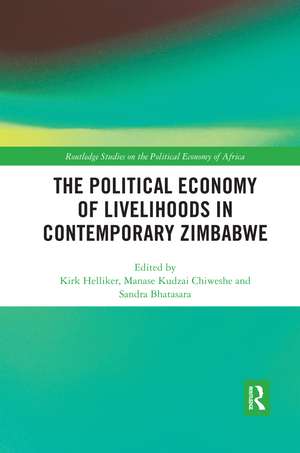The Political Economy of Livelihoods in Contemporary Zimbabwe: Routledge Studies on the Political Economy of Africa
Editat de Kirk Helliker, Manase Kudzai Chiweshe, Sandra Bhatasaraen Limba Engleză Paperback – 14 aug 2020
Highlighting an emergent scholarship amongst young black scholars in Zimbabwe, and providing an understanding of how people and communities respond to socio-economic challenges, this book is an important read for scholars of African political economy, southern African studies and livelihoods.
Toate formatele și edițiile
| Toate formatele și edițiile | Preț | Express |
|---|---|---|
| Paperback (1) | 387.38 lei 6-8 săpt. | |
| Taylor & Francis – 14 aug 2020 | 387.38 lei 6-8 săpt. | |
| Hardback (1) | 1060.25 lei 6-8 săpt. | |
| Taylor & Francis – 25 ian 2018 | 1060.25 lei 6-8 săpt. |
Din seria Routledge Studies on the Political Economy of Africa
-
 Preț: 311.56 lei
Preț: 311.56 lei -
 Preț: 387.20 lei
Preț: 387.20 lei -
 Preț: 382.75 lei
Preț: 382.75 lei -
 Preț: 384.48 lei
Preț: 384.48 lei -
 Preț: 381.39 lei
Preț: 381.39 lei - 18%
 Preț: 1000.61 lei
Preț: 1000.61 lei -
 Preț: 382.95 lei
Preț: 382.95 lei -
 Preț: 387.75 lei
Preț: 387.75 lei
Preț: 387.38 lei
Nou
Puncte Express: 581
Preț estimativ în valută:
74.12€ • 77.40$ • 61.21£
74.12€ • 77.40$ • 61.21£
Carte tipărită la comandă
Livrare economică 16-30 aprilie
Preluare comenzi: 021 569.72.76
Specificații
ISBN-13: 9780367593407
ISBN-10: 0367593408
Pagini: 246
Dimensiuni: 156 x 234 x 18 mm
Greutate: 0.4 kg
Ediția:1
Editura: Taylor & Francis
Colecția Routledge
Seria Routledge Studies on the Political Economy of Africa
Locul publicării:Oxford, United Kingdom
ISBN-10: 0367593408
Pagini: 246
Dimensiuni: 156 x 234 x 18 mm
Greutate: 0.4 kg
Ediția:1
Editura: Taylor & Francis
Colecția Routledge
Seria Routledge Studies on the Political Economy of Africa
Locul publicării:Oxford, United Kingdom
Public țintă
Postgraduate and UndergraduateCuprins
1: Introduction – Theorising the Political Economy of Livelihoods in Contemporary Zimbabwe Sandra Bhatasara, Manase Kudzai Chiweshe and Kirk Helliker 2: Livelihood Strategies of Urban Women: Emerging Evidence from Magaba, Harare Takunda Chirau 3: Construction of Livelihood Strategies in Budiriro, Harare Tafadzwa Chevo 4: Sex Work as a Livelihood Strategy in the Border Town of Beitbridge Wadzanai Takawira and Kirk Helliker 5: Migration and Survival in post-2000 Zimbabwe Manase Kudzai Chiweshe 6: Agricultural Production Systems of Small-Scale Farmers in Hwedza in the Context of Innovation Platforms Innocent Mahiya 7: Development NGOs – Understanding Participatory Methods, Accountability and Effectiveness of World Vision in Umzingwane District Kayla Knight Waghorn 8: A Critical Analysis of Community Participation at the Primary Level of the Health System in Goromonzi District Rachel Gondo 9: Climate Variability in Local Scales – Narratives and Ambivalences from Mutoko District Sandra Bhatasara 10: Livelihoods Vulnerability among Riverbed Farmers in Negande, NyamiNyami District Felix Tombindo 11: "Let Them Starve so that they ‘Hear’ us" – Differing Perspectives on Unresolved Land Occupations and Livelihoods at Mushandike Smallholder Irrigation Scheme, Masvingo District Jonathan Mafukidze 12: "Other People Inherit Property, But I Inherit People and Their Problems" – The Role of Kinship and Social Capital in Providing Care and Support for the HIV Infected and AIDS Affected, Chivanhu Informal Settlement, Masvingo Province Loveness Makonese 13: Insecure Land Tenure and Natural Resource Use in a Post Fast Track Area of Zimbabwe Takunda Chabata 14: Fast Track Land Reform Programme and Women in Goromonzi District Loveness Chakona and Manase Kudzai Chiweshe
Notă biografică
Kirk Helliker is Director of the Unit of Zimbabwean Studies, Rhodes University, South Africa.
Manase Kudzai Chiweshe is a Senior Lecturer at Chinhoyi University of Technology, Zimbabwe.
Sandra Bhatasara is a Senior Lecturer at the University of Zimbabwe.
Manase Kudzai Chiweshe is a Senior Lecturer at Chinhoyi University of Technology, Zimbabwe.
Sandra Bhatasara is a Senior Lecturer at the University of Zimbabwe.
Descriere
Highlighting an emergent scholarship amongst young black scholars in Zimbabwe, and providing an understanding of how people and communities respond to socio-economic challenges, this book is an important read for scholars of African political economy, Southern African Studies and livelihoods.
